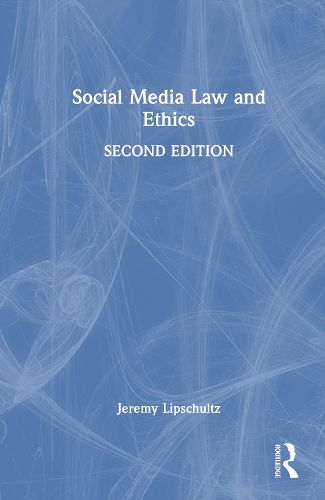Readings Newsletter
Become a Readings Member to make your shopping experience even easier.
Sign in or sign up for free!
You’re not far away from qualifying for FREE standard shipping within Australia
You’ve qualified for FREE standard shipping within Australia
The cart is loading…






In this textbook, social media professor Jeremy Harris Lipschultz introduces students to the study of social media law and ethics, integrating legal concepts and ethical theories.
This second edition explores freedom of expression, as it applies to students, media industry professionals, content creators and audience members. Key issues and practices covered include copyright law, data privacy, defamation, global law and ethics, generative AI, government censorship, social media platform rules, and employer policies. The book also addresses the U.S. government TikTok law and other recent regulation. Research techniques are also used to suggest future trends in social media law and ethics. Touching on themes and topics of significant contemporary relevance, this accessible textbook can be used in standalone law and ethics courses, as well as emerging social media courses that are disrupting traditional public relations, advertising, marketing and journalism curricula.
Case studies, discussion questions, and online resources help students engage with the practicalities, complexities and ambiguities of this future-oriented area of media law, making this an ideal textbook for students of media law, policy and ethics, mass media, and communication studies.
$9.00 standard shipping within Australia
FREE standard shipping within Australia for orders over $100.00
Express & International shipping calculated at checkout
In this textbook, social media professor Jeremy Harris Lipschultz introduces students to the study of social media law and ethics, integrating legal concepts and ethical theories.
This second edition explores freedom of expression, as it applies to students, media industry professionals, content creators and audience members. Key issues and practices covered include copyright law, data privacy, defamation, global law and ethics, generative AI, government censorship, social media platform rules, and employer policies. The book also addresses the U.S. government TikTok law and other recent regulation. Research techniques are also used to suggest future trends in social media law and ethics. Touching on themes and topics of significant contemporary relevance, this accessible textbook can be used in standalone law and ethics courses, as well as emerging social media courses that are disrupting traditional public relations, advertising, marketing and journalism curricula.
Case studies, discussion questions, and online resources help students engage with the practicalities, complexities and ambiguities of this future-oriented area of media law, making this an ideal textbook for students of media law, policy and ethics, mass media, and communication studies.